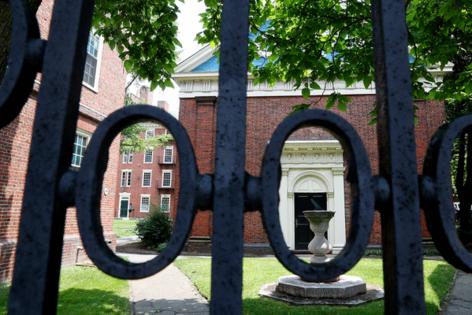Harvard rejects Trump administration's demands, as feds threaten to cut billions of dollars
Published in News & Features
BOSTON — Harvard University is standing up to the Trump administration, as the feds pressure the Cambridge school to end DEI programs and “audit” the viewpoints of its student body, faculty, and staff.
Harvard on Monday announced that it’s rejecting a list of demands from the Trump admin. This comes as the feds threaten to cut more $8.7 billion in multiyear grant commitments to Harvard and its affiliates amid an antisemitism investigation.
“The university will not surrender its independence or relinquish its constitutional rights,” Harvard’s lawyers wrote to the Trump admin in a letter. “Neither Harvard nor any other private university can allow itself to be taken over by the federal government. Accordingly, Harvard will not accept the government’s terms as an agreement in principle.
“Harvard remains open to dialogue about what the university has done, and is planning to do, to improve the experience of every member of its community,” the attorneys added. “But Harvard is not prepared to agree to demands that go beyond the lawful authority of this or any administration.”
Amid the antisemitism investigation, the feds have been calling on Harvard to eliminate Diversity, Equity, and Inclusion programs.
The feds have said Harvard must implement merit-based admissions policies, and end all preferences based on race, color, or national origin in admissions. Harvard must implement merit-based hiring policies, the feds added.
Then late Friday night, the Trump administration issued an updated and expanded list of demands.
“They include requirements to ‘audit’ the viewpoints of our student body, faculty, staff, and to ‘reduce the power’ of certain students, faculty, and administrators targeted because of their ideological views,” Harvard President Alan Garber wrote.
“It makes clear that the intention is not to work with us to address antisemitism in a cooperative and constructive manner,” the university president wrote about the feds’ letter. “Although some of the demands outlined by the government are aimed at combating antisemitism, the majority represent direct governmental regulation of the ‘intellectual conditions’ at Harvard.”
Garber claimed that the Trump administration’s demands violate Harvard’s First Amendment rights, and exceed the statutory limits of the government’s authority under Title VI of the Civil Rights Act.
“And it threatens our values as a private institution devoted to the pursuit, production, and dissemination of knowledge,” he wrote. “No government—regardless of which party is in power—should dictate what private universities can teach, whom they can admit and hire, and which areas of study and inquiry they can pursue.”
When it comes to antisemitism, Garber said the campus over the past 15 months has taken many steps to address antisemitism.
The university has adopted new accountability procedures, imposed discipline for those who violate university policies, enhanced programs to address bias, dedicated resources to combat hate and bias, enhanced safety and security measures, and more.
“As a result, Harvard is in a very different place today from where it was a year ago,” its lawyers wrote. “These efforts, and additional measures the university will be taking against antisemitism, not only are the right thing to do but also are critical to strengthening Harvard’s community as a place in which everyone can thrive.”
The Trump administration in its demand letter argued that Harvard in recent years has failed to live up to “intellectual and civil rights conditions that justify federal investment.”
“We therefore present the below provisions as the basis for an agreement in principle that will maintain Harvard’s financial relationship with the federal government,” the feds wrote. “If acceptable to Harvard, this document will constitute an agreement in principle, which the parties will work in good faith to translate into a more thorough, binding settlement agreement… We expect your immediate cooperation in implementing these critical reforms that will enable Harvard to return to its original mission of innovative research and academic excellence.”
_____
©2025 MediaNews Group, Inc. Visit at bostonherald.com. Distributed by Tribune Content Agency, LLC.







Comments